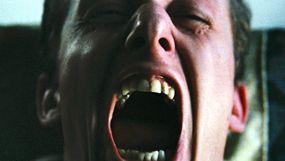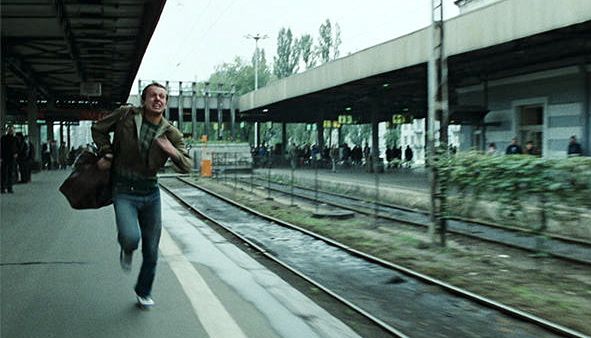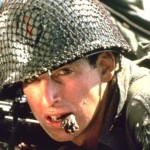Life is indeed a game of inches, Krzysztof Kieslowski appears to be telling us in “Blind Chance.”
The film, perhaps more descriptively titled “The Hand of Fate,” explores three possible outcomes of a young traveler’s attempts to catch a fast-moving train.
Paranoia runs deep in this, among the most political of Kieslowski’s films. Made in 1981, the brief springtime of Solidarity, the release was delayed for the better part of a decade by Poland authorities. Even when the film surfaced in the late 1980s, it had been censored.
Now we have an (almost) unmolested version of “Blind Chance” via the Criterion Collection, which previously released several of Kieslowski’s higher-profile films.
Director Kieslowski eventually found international fame with “The Double Life of Veronique” and the “Three Colors” trilogy, but the little-known “Blind Chance” may be “even the best and most original” of his works, says his close friend and fellow director Agnieszka Holland.
 Boguslaw Linda is terrific as the resourceful medical student slapped around by fate — specifically, the cascading consequences of frantically grasping — or not grasping — the handrail on the quickly departing train to Warsaw.
Boguslaw Linda is terrific as the resourceful medical student slapped around by fate — specifically, the cascading consequences of frantically grasping — or not grasping — the handrail on the quickly departing train to Warsaw.
The film offers three possible paths for the student’s life, all of which turn on the political realities of the day. In one branch, he becomes a communist party reformer. In another, a member of the opposition movement. In the third, he seeks the shelter of an apolitical domestic life — ironically, the most dangerous course of all.
Polish film critic Tadeusz Sobolewski, who talks about the film in the Criterion extras, says “Blind Chance” offended authorities not because of any political posturing, but because it was “a farewell to communist Poland.”
It feels at times like a Costa-Gavras film — filled with protests, creepy authorities and street-level paranoia — but the turmoil ultimately serves as a backdrop to the story of an everyman trying to get through life.
Kieslowski “was not really a political person,” Holland says. The young director was reeling at the time because of the death of his mother in an auto accident.
“He had the need to go beyond the surface layer of reality to something more personal, more spiritual … to explore the mechanisms behind human destiny in a dimension other than the purely relational one,” Holland says in the Blu-ray’s extra features.
Holland, who worked on the scripts to Kieslowski’s “Blue” and “White,” encouraged the director to remake the “Blind Chance” project in the U.S., removing the Polish political content — of limited interest to English-speaking audiences — and focusing on the “tragic aspect of human choice.”
At first, Kieslowski was “leisurely, thoughtlessly dismissed” as a local artist, his friend, boss and collaborator Krzysztof Zanussi has maintained.
“He was as universal at the beginning as at the end,” Zanussi said. “All of (his films) were good. … It is a tragic paradox of Krzysztof’s life that he was long undervalued outside Poland.” (The director died in 1996.)
Kieslowski’s writing and directing skills indeed seem to have arrived almost fully formed when he turned from documentaries to features. His early features are all products of the roiling 1970s and ’80s in Poland, but are not timepieces or simplistic attacks on the communists.
Kino released a handful of early Kieslowski dramas on DVD a decade ago: “The Scar” (1976), “Camera Buff” (1979), “Blind Chance” and “No End” (1985). Here’s hoping that Criterion — which rereleased “The Double Life of Veronique” on DVD and “Red,” “White” and “Blue” on Blu-ray and DVD — picks up the remaining feature films. They are works that go largely unseen and unappreciated, at least in the States.
Criterion’s “Blind Chance” looks and sounds fine, all things considered. The restored 4K digital transfer of the original uncensored film was approved by cinematographer Krzysztof Pakulski. The Blu-ray has an uncompressed stereo soundtrack.
One brief scene — of police brutality — is missing its images because of the original censorship. Criterion also provides in its extras an A-B comparison of the nine scenes that were censored upon “Blind Chance’s” release in 1987.
The Agnieszka Holland talk dates back to 2003 and was included in the Kino DVD releases. Tadeusz Sobolewski’s talk was done for Criterion and is new.
The Criterion release’s booklet includes an essay by critic Dennis Lim, who notes that the “comparatively vapid” “Run Lola Run” and “Sliding Doors” are descendants of “Blind Chance” and its structure of alternate personal histories. (Holland goes further, saying “Sliding Doors” was simply a ripoff.)
“It could be argued that ‘Blind Chance,’ a lodestone of Kieslowskian themes, is the Rosetta stone to his filmography,” Lim writes.
The booklet also includes a 1993 interview with Kieslowski. Criterion also released a new DVD of the title.




Leave a Reply